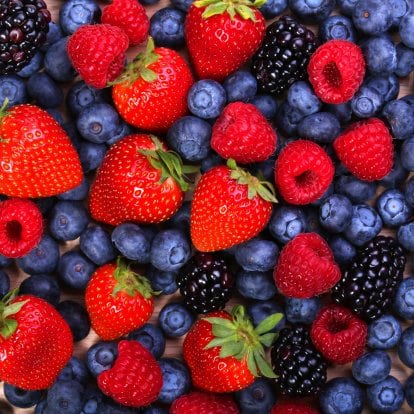Berries have four times more antioxidant activity than most other fruits, and 10 times more than most vegetables. Antioxidants reduce oxidative stress and chronic disease risk by scavenging potentially harmful free oxygen radicals.
Berries are also packed with vitamin C, fiber, magnesium and potassium. One cup of raspberries is only 65 calories and provides 53 percent of the daily value for vitamin C, and 32 percent of the daily value for fiber.
Overall, dietary surveys reveal that berry-rich diets are associated with: healthy body weight, a reduction in risk factors for cardiovascular disease, and improvements in mood and cognitive function. The health benefits of berries have been in the news for a long time, so it is surprising that berry consumption remains so low.
On average, a person living in the United States consumes one white potato a day, and a mere one tablespoon of berries per week. The bottom line is that berries are low in calories, and rich in nutrients that support overall health and wellbeing. We need to eat more of them.
Set a reasonable goal such as one-half cup of berries each day. To achieve this goal, consider adding berries to your diet in new ways. Try them in yogurt, smoothies and salads. Use a toothpick to dip berries in yogurt, and freeze on a lined cookie sheet to make a frosty snack kids will love. Or make this fresh blueberry sauce and serve it as a healthy alternative to pancake syrup or as a dipping sauce for chicken tenders and kebabs.
Fresh Blueberry Sauce (recipe inspired by Nigella Lawson)
Bring to a boil, and then simmer two to three minutes:
- ¼-½ cup maple syrup (to taste)
- 1 ½ cups blueberries, fresh or frozen
- Optional additions: vanilla bean, cinnamon stick, orange zest
Does cooking destroy the nutritional value of berries? No. Cooking actually rearranges the shape of the antioxidant molecules in berries enabling you to absorb more of them. Berries in any form (fresh, frozen, dried, and cooked) are good for you, but fresh berries are the highest in vitamin C which supports healthy hair, nails, and skin, and aids iron and calcium absorption.
Though berries are on the expensive side, you can save money by shopping savvy. Look for sales when shopping for fresh berries in the grocery store, and always open the clam-shell box to examine them. If you see juice or mold, skip them and go to the frozen department. Pay less per pound by purchasing frozen berries in bulk (five-pound bags) and look for frozen wild blueberries, which are higher in antioxidants than their cultivated cousins. Another way to save is by picking your own.
In Eastern Connecticut, strawberries are available in June, blueberries from mid July through August, and raspberries from July to the end of summer. Berries stay fresh three to seven days in the crisper drawer of the refrigerator. To extend their life, spread berries out in a single layer on a lined cookie sheet, freeze until solid, and transfer to heavy duty storage bags. Frozen berries and other fruit keep well for 12-18 months.

